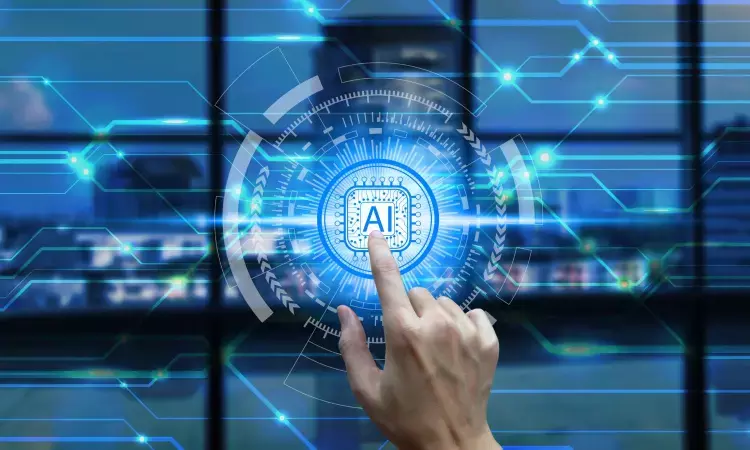- Home
- Medical news & Guidelines
- Anesthesiology
- Cardiology and CTVS
- Critical Care
- Dentistry
- Dermatology
- Diabetes and Endocrinology
- ENT
- Gastroenterology
- Medicine
- Nephrology
- Neurology
- Obstretics-Gynaecology
- Oncology
- Ophthalmology
- Orthopaedics
- Pediatrics-Neonatology
- Psychiatry
- Pulmonology
- Radiology
- Surgery
- Urology
- Laboratory Medicine
- Diet
- Nursing
- Paramedical
- Physiotherapy
- Health news
- Fact Check
- Bone Health Fact Check
- Brain Health Fact Check
- Cancer Related Fact Check
- Child Care Fact Check
- Dental and oral health fact check
- Diabetes and metabolic health fact check
- Diet and Nutrition Fact Check
- Eye and ENT Care Fact Check
- Fitness fact check
- Gut health fact check
- Heart health fact check
- Kidney health fact check
- Medical education fact check
- Men's health fact check
- Respiratory fact check
- Skin and hair care fact check
- Vaccine and Immunization fact check
- Women's health fact check
- AYUSH
- State News
- Andaman and Nicobar Islands
- Andhra Pradesh
- Arunachal Pradesh
- Assam
- Bihar
- Chandigarh
- Chattisgarh
- Dadra and Nagar Haveli
- Daman and Diu
- Delhi
- Goa
- Gujarat
- Haryana
- Himachal Pradesh
- Jammu & Kashmir
- Jharkhand
- Karnataka
- Kerala
- Ladakh
- Lakshadweep
- Madhya Pradesh
- Maharashtra
- Manipur
- Meghalaya
- Mizoram
- Nagaland
- Odisha
- Puducherry
- Punjab
- Rajasthan
- Sikkim
- Tamil Nadu
- Telangana
- Tripura
- Uttar Pradesh
- Uttrakhand
- West Bengal
- Medical Education
- Industry
Generative AI's diagnostic capabilities comparable to non-specialist doctors, claims research

The use of generative AI for diagnostics has attracted attention in the medical field and many research papers have been published on this topic. However, because the evaluation criteria were different for each study, a comprehensive analysis was needed to determine the extent AI could be used in actual medical settings and what advantages it featured in comparison to doctors.
A research group led by Dr. Hirotaka Takita and Associate Professor Daiju Ueda at Osaka Metropolitan University's Graduate School of Medicine conducted a meta-analysis of generative AI's diagnostic capabilities using 83 research papers published between June 2018 and June 2024 that covered a wide range of medical specialties.
Of the large language models (LLMs) that were analyzed, ChatGPT was the most commonly studied.
The comparative evaluation revealed that medical specialists had a 15.8% higher diagnostic accuracy than generative AI. The average diagnostic accuracy of generative AI was 52.1%, with the latest models of generative AI sometimes showing accuracy on par with non-specialist doctors.
"This research shows that generative AI's diagnostic capabilities are comparable to non-specialist doctors. It could be used in medical education to support non-specialist doctors and assist in diagnostics in areas with limited medical resources." stated Dr. Takita.
"Further research, such as evaluations in more complex clinical scenarios, performance evaluations using actual medical records, improving the transparency of AI decision-making, and verification in diverse patient groups, is needed to verify AI's capabilities."
The findings were published in npj Digital Medicine.
Reference:
Hirotaka Takita, Daijiro Kabata, Shannon L. Walston, Hiroyuki Tatekawa, Kenichi Saito, Yasushi Tsujimoto, Yukio Miki, Daiju Ueda. A systematic review and meta-analysis of diagnostic performance comparison between generative AI and physicians. npj Digital Medicine, 2025; 8 (1) DOI: 10.1038/s41746-025-01543-z
Dr Kamal Kant Kohli-MBBS, DTCD- a chest specialist with more than 30 years of practice and a flair for writing clinical articles, Dr Kamal Kant Kohli joined Medical Dialogues as a Chief Editor of Medical News. Besides writing articles, as an editor, he proofreads and verifies all the medical content published on Medical Dialogues including those coming from journals, studies,medical conferences,guidelines etc. Email: drkohli@medicaldialogues.in. Contact no. 011-43720751


